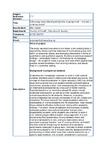Enhancing intercultural participation in group work – towards a working model
| dc.contributor.author | Joyner, M | |
| dc.contributor.author | Cotton, D | |
| dc.contributor.author | Wai Mun Lim | |
| dc.contributor.author | George, R | |
| dc.contributor.other | Faculty of Health & Human Sciences | en_US |
| dc.date.accessioned | 2018-09-07T11:13:06Z | |
| dc.date.available | 2018-09-07T11:13:06Z | |
| dc.date.issued | 2010 | |
| dc.identifier.uri | http://hdl.handle.net/10026.1/12237 | |
| dc.description | File replaced (incorrect version) on 14/9/2022 by KT (LDS). | |
| dc.description.abstract |
The study reported here aims to contribute to the existing body of research by observing three instances of multicultural group work within an academic setting and analysing interactions in terms of quantitative and qualitative aspects. Building on previous research findings – particularly those on the importance of pedagogic design - we sought to create a group work task which applied best practice recommendations from existing literature, and tested them in a controlled setting. Graduates are increasingly expected to work in multi-cultural contexts, therefore skills in intercultural interaction are crucial. The concept of internationalisation in higher education (HE) has shifted away from a narrow focus on student mobility and international recruitment, towards a wider view emphasising the importance of an international perspective as a key part of higher learning. Potential benefits of an internationalised HE sector include enhanced employability as well as a richer academic and socio-cultural experience for all students. However, in practice, internationalisation has proved problematic in the UK context and elsewhere. Previous research has raised questions about the practicalities of internationalising the HE experience; most notably, those related to effective multicultural mixing within academic settings. The extant literature indicates that overseas students anticipate positive inter-cultural interaction but are often disappointed as some home students are unwilling to work in inter-cultural groups without explicit encouragement. It is well-documented that spontaneous mixing between home and international students is rare, owing to reservations about perceived language barriers, fear of causing offence, and belief that inter-cultural mixing may be detrimental to academic performance especially in group work. One way in which students can be encouraged to mix is through carefully designed teaching and learning activities which have inter-cultural interaction as a specific goal; however, this is rarely considered in curriculum planning. For those tutors who do make targeted efforts, it is possible to steer students towards fruitful discussion and such active management of student encounters can greatly enable the development of intercultural adaptability. | en_US |
| dc.description.sponsorship | TFAS | en_US |
| dc.language.iso | en | |
| dc.publisher | University of Plymouth | en |
| dc.subject | equality; diversity; student experience; groupwork; inclusivity; | en_US |
| dc.title | Enhancing intercultural participation in group work – towards a working model | en_US |
| dc.type | Report | en_US |
| plymouth.date-start | 2010-2011 | en_US |


